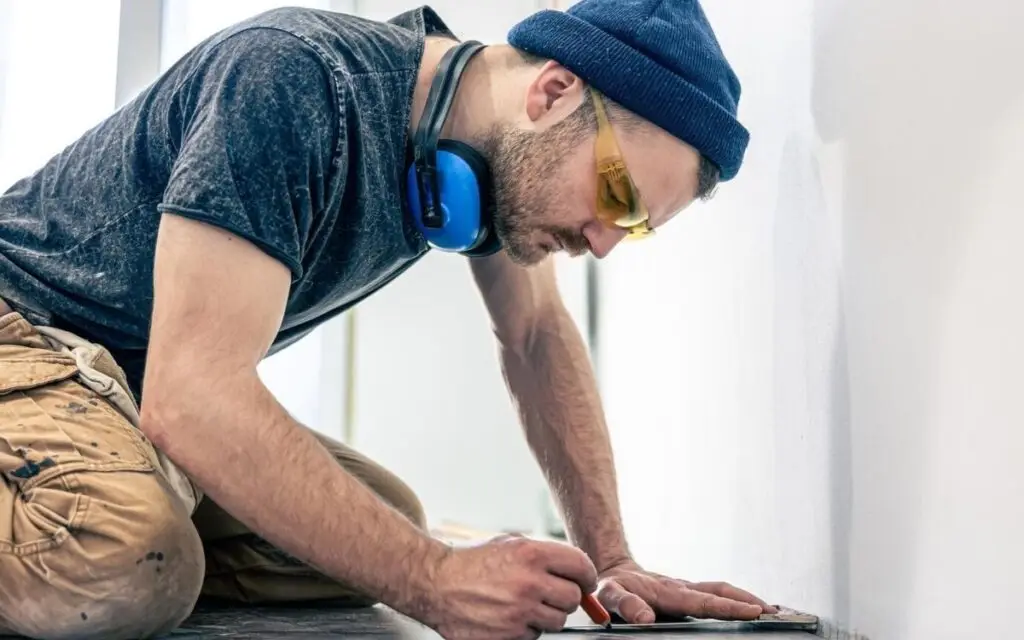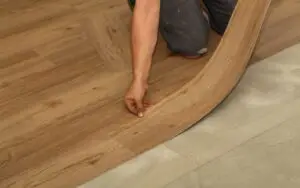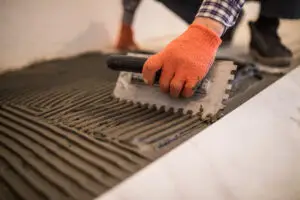The DIY Flooring Installation Path
What to Consider Before Starting DIY
Your Skill Level and Experience
Before you decide to install flooring yourself, assess your skill level and experience with home improvement projects. Have you successfully completed similar tasks before? Are you comfortable using tools like saws, levels, and measuring devices? Being honest about your abilities is crucial for a successful DIY project. If you do not have a lot of experience, you should seriously consider hiring a professional to ensure the project is done right.
Tools and Equipment Needed
Installing flooring requires specific tools and equipment, which can be expensive to purchase if you don’t already have them. These may include a saw, measuring tape, spacers, a tapping block, a level, and more, depending on the type of flooring. Consider whether the cost of these tools outweighs the cost of hiring a professional. A professional will already have all the necessary tools, saving you the upfront costs.
Time Commitment and Availability
DIY projects often take longer than expected, requiring a significant time commitment. Consider your availability and whether you can realistically dedicate the necessary time to complete the project correctly. In addition, it’s easy to overlook that a DIY project can interrupt your daily life and routine. Professional installers will finish the project quickly and accurately.
Potential Challenges and Pitfalls of DIY
Common Mistakes and How to Avoid Them
DIY flooring installations often come with common mistakes, such as improper subfloor preparation, uneven plank placement, incorrect measurements, or overcutting the flooring. These mistakes can lead to a flawed finished floor, increased material costs, and the need for further repairs. Professionals can avoid these pitfalls because of their experience and training.
Risk of Improper Installation
Improper installation can lead to issues like buckling, warping, or gaps in your flooring, which can significantly impact the appearance and longevity of your investment. If not installed correctly, water can easily damage it as well. Professional installers are trained to prevent these issues, saving you time, money, and stress.
Time Management Issues
DIY projects can easily take longer than planned due to unexpected issues, resulting in delays and disruption of your routine. Poor time management and planning will affect the entire project. Hiring a professional helps avoid any time management issues or delays in your project, and ensures that the flooring will be installed in a timely fashion, so you can get back to normal.
The Professional Flooring Installation Path
Benefits of Hiring a Professional
Expertise and Precision
Professional flooring installers have the necessary expertise, experience, and skills to perform the job with precision. They know the best installation techniques and how to handle various challenges, ensuring the best finished product. Their knowledge can help ensure that your flooring will last for years to come.
Efficiency and Time Savings
Hiring a professional installer can save you significant time and effort. They can complete the project much more quickly than a DIYer while ensuring quality workmanship. This means less disruption to your routine and allows you to enjoy your new floors sooner.
Warranty and Insurance
Reputable professional installers often provide a warranty on their labor and, in some cases, the materials. This protects you from unexpected issues that may arise, giving you peace of mind. Additionally, they are insured, protecting you from liability if any accidents occur during the installation process. This is something a DIYer cannot provide, and it gives a huge peace of mind for the homeowner.
What to Look for in a Professional Installer
Experience and Reputation
Choose an installer who has a proven track record of experience and a strong positive reputation. You should check reviews, ask for references, and review their portfolio of past work. An experienced and reputable installer will deliver higher quality work, and will help avoid any issues that may arise in the future.
Licensing and Certifications
Make sure the installer is licensed and certified in your area. This shows they have met the professional standards in your industry, and that they are committed to quality and professionalism. Licensing and certifications also offer an added layer of security, knowing that you’re working with someone who is qualified.
Quotes and Estimates
Get multiple quotes from different installers. Make sure that each quote is detailed and includes all costs, such as materials, labor, and any additional fees. A detailed quote ensures that there are no hidden costs, and gives you the best option to plan for the overall cost.
DIY vs Professional: A Detailed Comparison
Cost Analysis: DIY vs Professional
Initial Costs and Long-Term Value
Initially, DIY flooring installation can seem more cost-effective because you are saving on labor costs. However, by not considering the hidden costs of DIY projects, a DIY install can end up being more expensive in the long run. Professional installation may have higher upfront costs, but it will often provide better value in the long run through warranties, long-lasting installation, and avoiding costly mistakes.
Hidden Costs of DIY Projects
Hidden costs of DIY flooring installation projects can include the cost of tools, wasted materials, the need to redo mistakes, and time spent fixing issues. These costs often add up, exceeding what was originally estimated. Hiring a professional can often give you a more accurate estimate that will not surprise you with unforeseen issues.
Quality of Work: DIY vs Professional
Potential for Errors and Imperfections
DIY flooring installations carry a high risk of errors, such as uneven seams, gaps, or incorrectly installed planks. These imperfections will impact the longevity and aesthetic appearance of the flooring. Professional installers have the expertise to prevent these errors, giving you a flawless finish.
Longevity and Durability
Professional installations often result in longer-lasting flooring. Professionals use high-quality materials and installation techniques that extend the life of your floor. The better your floor is installed, the better it will hold up over time.
Time and Convenience: DIY vs Professional
Time Commitment and Flexibility
DIY projects require a significant time commitment and can be quite disruptive to your daily life. A professional installation is usually much more efficient, saving you time and hassle. Professionals are used to working efficiently, and will complete the project as soon as possible, to limit the disruption to your daily routine.
Project Management and Coordination
Professional installers handle all aspects of the project, from material procurement to clean-up, relieving you of these responsibilities. They have the experience to handle the logistics and will ensure the project stays on schedule. By hiring a professional, you can sit back and enjoy the end result, without having to worry about the process.
Scenarios Where Professional Installation is Recommended
Complex Installations and Unique Designs
Intricate Patterns and Borders
For complex installations that involve intricate patterns or borders, professional installation is highly recommended. These installations require precision and skill, and are more challenging for a DIYer to accomplish. Professionals are experts at these types of projects, ensuring that they will be completed accurately and beautifully.
Handling Subfloor Issues
If your subfloor is uneven, damaged, or requires significant preparation, it is best to leave this to a professional. They will properly assess and repair the subfloor to ensure a stable and even surface for the flooring. Improper subfloor prep can ruin the whole installation, so it’s best to leave this to an expert.
Large-Scale Projects
Time Constraints and Deadlines
For large-scale projects, professionals are equipped to handle them more quickly and efficiently. They can properly plan and execute large flooring installations, while ensuring the project is completed on time, and within budget.
Ensuring a Consistent Finish
Large projects require extra care to ensure a consistent finish and proper installation. Professionals will have the tools and knowledge to ensure a consistent finish throughout, giving you the peace of mind of knowing it was done correctly.
When DIY May Be Suitable
Simple and Straightforward Layouts
If you’re installing flooring in a small room with a simple layout, a DIY project might be feasible if you have some basic skills and tools. Even in a small area, you need to ensure you are following all of the best practices, to ensure your project is successful.
Budget-Conscious Projects
If your budget is extremely tight, and you only want to install basic flooring in a small room, a DIY project may help reduce costs. However, it is still important to ensure that your work will not end up costing you more in the long run.
FAQs & Answers
While DIY flooring installation may appear cheaper initially, there are often hidden costs that can quickly add up, such as the need for specialized tools, wasted materials, and the potential for mistakes that require professional repairs. Professional installers not only have the right tools and experience, but can ensure a perfect install, saving you time, money, and frustration. Therefore, the long term value of a professional install often outweighs the cost.
The biggest risks of DIY flooring installation include improper subfloor preparation, uneven plank placement, and incorrect measurements, all of which can lead to an unstable floor, damage to the material, or the need for expensive repairs. Professionals can ensure a flawless install from start to finish, preventing many common issues that DIYers often face. A professional is an investment into your home and ensures a proper install that will last for years.
Choosing the right flooring contractor involves looking for an experienced and reputable professional who is licensed, insured, and willing to provide multiple quotes. It's also important to check reviews and ask for references from previous customers. A good professional will also provide a clear contract with details of the project and timelines. Doing this research ensures that the job is done right and that you’re working with a professional.
Hiring a professional can save you a significant amount of time. They have the experience and manpower to complete the project efficiently and quickly. DIY projects are often more time-consuming, especially if you don't have prior experience and if there are unexpected delays. Professionals can also help you avoid many common delays that DIYers encounter.
A good professional flooring installer should provide a warranty for their labor and often for the materials, guaranteeing that any issues that may arise from faulty installation will be addressed at no additional cost to you. A warranty can give you peace of mind knowing that your investment is protected, and that your flooring will last for a long time.





